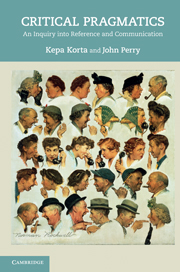Book contents
- Frontmatter
- Contents
- Preface
- Acknowledgments
- 1 Introduction
- 2 A short history of reference
- 3 Acts, roles, and singular reference
- 4 Elements of reference
- 5 Demonstratives
- 6 Context sensitivity and indexicals
- 7 Names
- 8 Definite descriptions
- 9 Implicit reference and unarticulated constituents
- 10 Locutionary content and speech acts
- 11 Reference and implicature
- 12 Semantics, pragmatics, and Critical Pragmatics
- 13 Harnessing information
- 14 Examples
- Bibliography
- Index
2 - A short history of reference
Published online by Cambridge University Press: 05 March 2013
- Frontmatter
- Contents
- Preface
- Acknowledgments
- 1 Introduction
- 2 A short history of reference
- 3 Acts, roles, and singular reference
- 4 Elements of reference
- 5 Demonstratives
- 6 Context sensitivity and indexicals
- 7 Names
- 8 Definite descriptions
- 9 Implicit reference and unarticulated constituents
- 10 Locutionary content and speech acts
- 11 Reference and implicature
- 12 Semantics, pragmatics, and Critical Pragmatics
- 13 Harnessing information
- 14 Examples
- Bibliography
- Index
Summary
Introduction
The topic of this book is certain kinds of utterances, those in which the speaker refers to an object or objects, and predicates properties of it, or a relation among them. We are interested in how the differences among the ways we have of referring to things connect to the different effects that such utterances have on those who hear them, and how this is reflected in the intentions of those who use them. Whatever intrinsic interest the topic may have is augmented by the central role singular reference played in the philosophy of language throughout the twentieth century, and continues to play. If we understand singular reference, we should be able to explain its pragmatics.
Our main aim in this chapter is to sketch some main developments in thinking about reference, from Frege to Kaplan, and then to suggest how we see ourselves fitting, and not fitting, into this tradition.
One hundred-plus years of reference
The issue of singular reference was intensely investigated by philosophers during the twentieth century, and lively interest in the topic continues. The inquiry is usually regarded as a matter of semantics, the theory of meaning and truth. The key question is usually taken to be what contribution referring expressions make to the truth-conditions of the statements of which they are a part, and not how they fit into the speaker's plan to convey implicatures and perform speech acts.
- Type
- Chapter
- Information
- Critical PragmaticsAn Inquiry into Reference and Communication, pp. 15 - 24Publisher: Cambridge University PressPrint publication year: 2011



